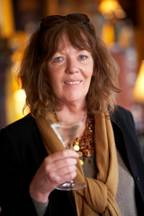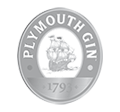 Geraldine Coates is the sort of person who makes new chums wherever she goes. This author and gin expert’s enthusiasm for all things gin knows no bounds and I can’t imagine a better sipping companion. The main reason for the warm welcome she receives in bars around the world is her tireless promotion of gin, yet when she began taking an interest in what’s now considered an exciting spirit, some might have thought she’d backed the wrong horse. Juliet Lawrence Wilson gets the lowdown.
Geraldine Coates is the sort of person who makes new chums wherever she goes. This author and gin expert’s enthusiasm for all things gin knows no bounds and I can’t imagine a better sipping companion. The main reason for the warm welcome she receives in bars around the world is her tireless promotion of gin, yet when she began taking an interest in what’s now considered an exciting spirit, some might have thought she’d backed the wrong horse. Juliet Lawrence Wilson gets the lowdown.
GC: “It all started when the now defunct NewLifeStyle publishers were producing a series of books on spirits. I was asked to write about brandy or gin and immediately chose gin. I’ve always been fascinated by gin’s incredibly interesting social history and liked the notion of it being down in the gutter then rising up again.”
Gin still has a lot of catching up to do with vodka but Coates argues that that’s changing.
GC: “Yes, most young people on a night out will be ordering vodka but at the higher end of the market a huge change can be seen and gin is really taking off. It takes quite a while to filter down. The exciting thing is that there are now so many different brands and flavours. Distillers are constantly experimenting with botanicals so there’s a lot of choice. Gin has come really far in last ten years.”
Although you may find your local Waterstones laden with wine and whisky books Coates’s new gin tome “The Mixellany Guide to Gin” is the first to be published in ten years since she wrote “Classic Gin”. The new book is a basic ‘all you need to know’ guide to gin: history, production, tasting techniques and explanations of all the current brands are to be found here. With so much to write about, where did she begin?
GC: “As people have got more interested in gin there’s a lot of disinformation swirling around the Internet so I was quite keen to go to original sources. I’d collected a lot of research over the years and I’ve spent a lot of time looking in places like the Guildhall Library, a beautiful place to work. “
Coates found a veritable goldmine of gin information and history including records of various intriguing organisations such as the Rectifier’s Club.
GC: “The Rectifiers’ Club started in the 1820s and was basically a gang of London distillers (who would perhaps be considered a bit of a mafia nowadays), essentially a rudimentary closed shop. They met regularly over dinner and a bit of a knees up to discuss various aspects of their business. What was amazing was to see the list of members – people like Mr. Gordon, Mr. Tanqueray, and Mr. Booth, names that are still around today. It was incredible because gin as an industry is still all about the people.”
Another example of gin’s history that will raise a wry smile from many cocktail lovers is the old but ongoing debate about the relationship between drinking and lawlessness, particularly in Scotland where the current Government feel the need to protect our innocent lips from over-indulgence at every opportunity.
GC: “Oh, since the first alcohol ever was made I think there’s been tension between normal people who see alcoholic drink as something to be enjoyed and appreciated and the controllers who see it as the root of all evil. One lovely little nugget I found was that, so convinced were the authorities that banning booze in America would end all criminal behaviour that many US towns actually closed down their jails when Prohibition came into force in January 1920. Of course we now know Prohibition was directly responsible for organised crime and gangsters like Al Capone who made millions out of illicit booze.”
There’s obviously much to be enthusiastic about but Coates sees the relationship with the old and new as an exciting development.
GC; “Brands are certainly experimenting but often this manifests in going back to the traditional flavours. That makes sense as gin has its origins in ancient medicines and cures. I’ve recently rediscovered the lemon slice after disliking extra citrus in my G&Ts for a long time. One of my gin heroes Desmond Payne, the master distiller for Beefeater, told me that he’d started using lemon again because he realised he liked traditional things. I suppose I like traditional things too!”
Yet with all the development, new flavours and fashionable brands why do some people still simply ‘not like gin’?
GC: “My theory for what it’s worth is that some people think they don’t like gin because they don’t like tonic. Gin and tonic water is a fantastic combination but a Marmite thing: you love it or you hate it. I go off tonic water too from time to time and when I do I’ll make an Elderflower Collins: gin, elderflower cordial, ice, soda and a float of lime. Delicious but very simple to make. Another alternative is ‘Gin and Ging’: gin and ginger ale, with a slice of lime. Appletiser also works brilliantly.”
Coates has built up solid relationships with bartenders and mixologists over the years but has recently made a successful foray into consumer tastings, her Gintime events becoming ever more popular at the UK’s top food and drink exhibitions.
GC: “I love doing it, people take away new knowledge and become so interested in gin’s history, the botanicals and how it’s made. They come in thinking ‘gin is gin’ and that a Gin Masterclass is almost an oxymoron but after tasting a few different ones their imagination is captured. Consumers are really beginning to develop a connoisseurship around gin like they might with whisky and wine.”
After looking back at so much of Gin’s fascinating and exotic history, what does Coates hope for next?
GC: There’s been a huge focus on reinventing classic cocktails over the last couple of years that has been great. And, I’m looking forward to some more real breakthrough cocktails like Dick Bradsell’s Bramble and Audrey Saunders’ Gin Gin Mule.”
That’s something for us all to look forward to!
Geraldine’s favourite cocktail: “Clover Club – a mixture of gin, lemon juice, grenadine (some make it with raspberry syrup) and egg white. It’s delicious!”
Geraldine’s Bar picks: “Bramble in my home town of Edinburgh is one of the best bars in the world especially for gin. In London I enjoy going to Quo Vadis in Soho, which has a very elegant cocktail menu and also The Lonsdale and Portobello Star in Notting Hill.”

 Geraldine Coates is the sort of person who makes new chums wherever she goes. This author and gin expert’s enthusiasm for all things gin knows no bounds and I can’t imagine a better sipping companion. The main reason for the warm welcome she receives in bars around the world is her tireless promotion of gin, yet when she began taking an interest in what’s now considered an exciting spirit, some might have thought she’d backed the wrong horse. Juliet Lawrence Wilson gets the lowdown.
Geraldine Coates is the sort of person who makes new chums wherever she goes. This author and gin expert’s enthusiasm for all things gin knows no bounds and I can’t imagine a better sipping companion. The main reason for the warm welcome she receives in bars around the world is her tireless promotion of gin, yet when she began taking an interest in what’s now considered an exciting spirit, some might have thought she’d backed the wrong horse. Juliet Lawrence Wilson gets the lowdown.


